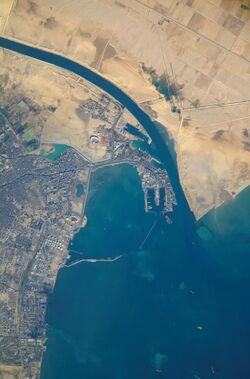Debouch
Topic: Earth
 From HandWiki - Reading time: 4 min
From HandWiki - Reading time: 4 min

In hydrology, a debouch (or debouche) is a place where runoff from a small, confined space discharges into a larger, broader body of water. The word is derived from the French verb déboucher (French: [debuʃe]), which means "to unblock, to clear". The term also has a military usage.[1]
Geology
In fluvial geomorphology, a debouch is a place where runoff from a small, confined space emerges into a larger, broader space. Common examples are when a stream runs into a river or when a river runs into an ocean. Debouching can generate massive amounts of sediment transport. When a narrow stream travels down a mountain pass into a basin, an alluvial fan will form from the mass deposit of the sediment. The four largest rivers (the Amazon, the Ganges, the Yangtze and the Yellow) are responsible for 20% of the global discharge of sediment in to the oceans by debouches.[2]
Geography
In fluvial geography, a debouch is a place where a body of water pours forth from a narrow opening. Some examples are: where a river or stream emerges from a narrow constraining landform, such as a defile, into open country or a wider space; a creek joins a river; or a stream flows into a lake.[3]
Military
In military usage of debouch: as a noun, a fortification at the end of a defile is sometimes known as a debouch; and as a verb, soldiers emerging from a narrow space and spreading out are also said to "debouch".[4]
See also
References
- ↑ Ma, Yanxia (2009). Continental Shelf Sediment Transport and Depositional Processes on an Energetic, Active Margin: the Waiapu River Shelf, New Zealand. pp. 2, 19. doi:10.25773/v5-8w3d-wz58. https://scholarworks.wm.edu/etd/1539616757/.
- ↑ "debouch as a noun". http://www.oed.com/view/Entry/47918?rskey=Lfbkiz&result=1&isAdvanced=false#eid.
- ↑ Mitchell, Martha S. (May–June 2000). River Rules: The Nature of Streams. p. 5. http://www.forester.net/ec_0005_river.html.
- ↑ "debouch as a verb". http://www.oed.com/view/Entry/47919#eid7298094.
External links
 |
 KSF
KSF

